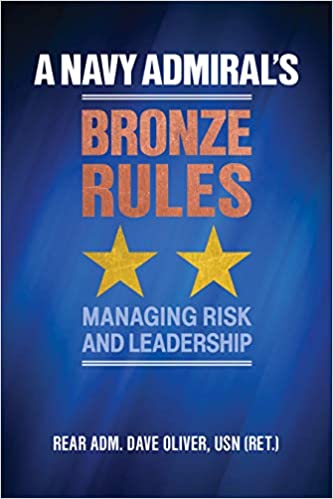Reviewed by Master Chief David Mattingly, US Navy (Retired)
Rear Admiral Dave Oliver spent a career as a submarine officer, a leader within the Navy and Department of Defense, and as an executive in several Fortune 500 companies. He has been a writer about leadership most notably Lead On! A Practical Guide to Leadership published in 1992. In Lead On he introduced the reader to the concept where he compares his Bronze Rules to the metal bronze, which is strong, highly resistant to corrosion, and can withstand challenges. In Lead On and Bronze Rules, Admiral Oliver uses sea stories to present leadership concepts that are applicable to small units as well as large military commands or civilian operations.
After graduating from the U.S. Naval Academy, Oliver was commissioned in 1963 and served as a submarine officer in a community led by Admiral Hyman Rickover. Oliver’s career transcended a Navy fighting a Cold War while also engaged in Vietnam, The Navy was also adapting to a changing American society. The civil rights movement granted to minority civilians rights and privileges which into the late 1960 were not granted to minority Sailors. Lastly, women Sailors were barred from many career fields which hindered their promotion to higher levels of rank and leadership. Each of these challenges required Navy leaders to act within the Navy’s Core Values however over and over the reader will see examples of Sailors in leadership positions that failed in their roles as a leader as well as civilian that may have been good managers but failed as leaders.
As Oliver points out Chief of Naval Operations Admiral Elmo Zumwalt (1970-1974) instituted some of the greatest social changes in the Navy from the standpoint of removing both racial and sexist barriers and making it a service that treated enlisted Sailors with dignity and respect. Zumwalt believed the secret to getting a strong Navy of the future was to immediately begin solving institutional racism and harassment problems. Oliver points out that the “old guard” fought and challenged the new rules which he issued as a series of Z-Grams to the fleet. The “old guard” thought the changes would adversely affect the combat effectiveness and morale of the Navy. Oliver, who was then on the CNO’s staff said that national birth rates indicated the future Navy would include more women and minorities.
One of the arguments that the “old guard” made against women serving at sea was the perceived health issues involved in pregnancy aboard ship. After establishing that the medical odds were lower for a woman developing a situation during pregnancy than a man developing a male-only medical condition that the Navy did not screen men going into sea billets Oliver approached then Chief of Naval Personnel Vice Admiral Mike Boorda. Oliver argues that women were being set up for failure. “Instead of being encouraged, these Sailors were invited to fail.”
With this crack in the Navy’s policy, Oliver was able to open the Navy‘s sea and top leadership positions to thousands of women. Oliver goes on to tell a sea story of how female Sailors were challenged during an exercise in Alaska. A team was to go ashore and establish stations to monitor Soviet Navy activities. Oliver ordered that all team members including the women assigned would be responsible for carrying the team’s equipment. Although others countered his order, he stood fast. The teams returned to the ship carrying their equipment and saluted the colors when they came aboard. “There was no mention below decks about weakness.”
Oliver’s use of sea stories from both the Navy and his second career in corporate America makes the “rules” not only understandable but relevant to today’s leaders. Although some may react that they are dated, going back to his early career. I would argue that many challenges of leadership have not changed but have only taken on a different twist with time. For example, the sexual harassment that he investigated is still seen today in today’s news reports of Navy leaders being disciplined over the same issues.
Bronze Rules is a very good read and belongs on the shelf of Navy leaders. At the end of the book, Oliver lists his “Bronze Rules” by first stating. “The only golden rule is to never betray your ethics or risk your integrity.”
Master Chief Mattingly retired with over 30 years of service in the Navy. He also served as a Senior Intelligence Officer and Senior Research Analyst in the US Intelligence Community.
A Navy Admiral’s Bronze Rules: Managing Risk and Leadership (RADM Dave Oliver, USN (Ret.), Naval Institute Press, Annapolis, MD, 2021).


